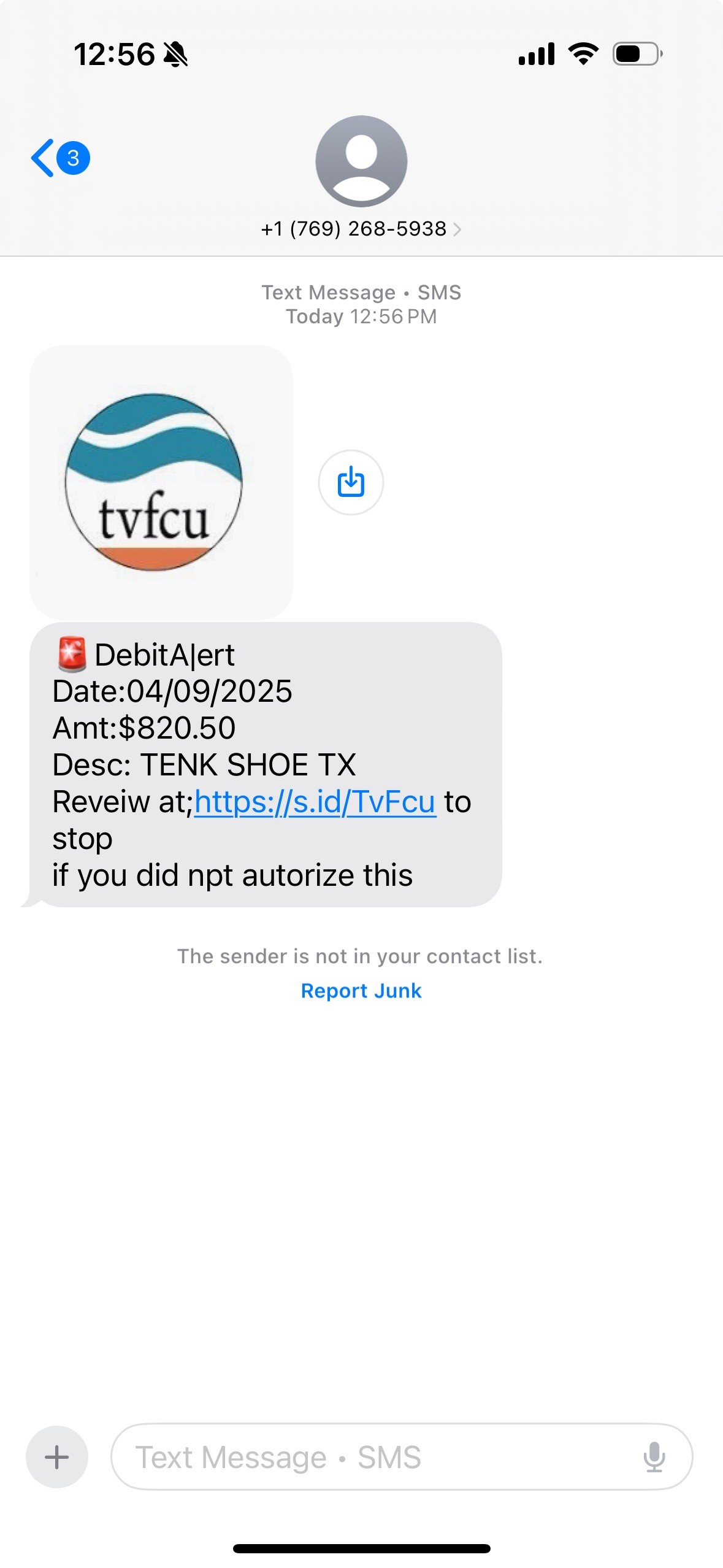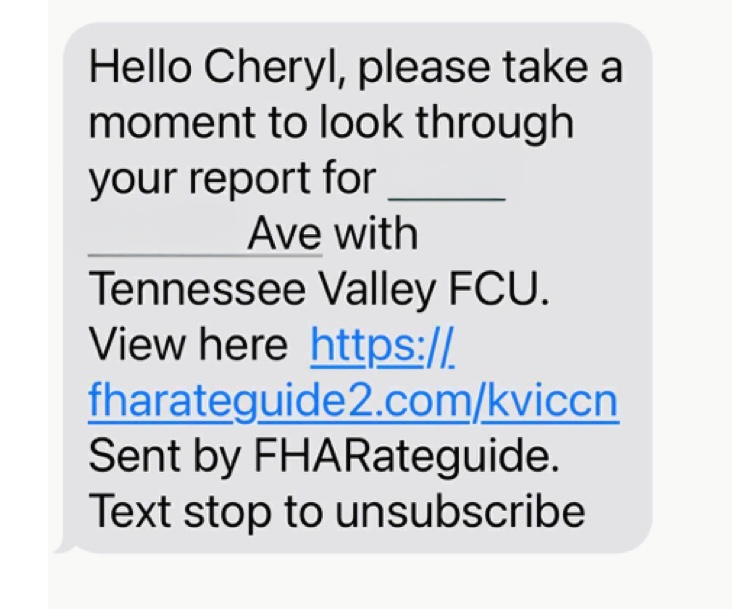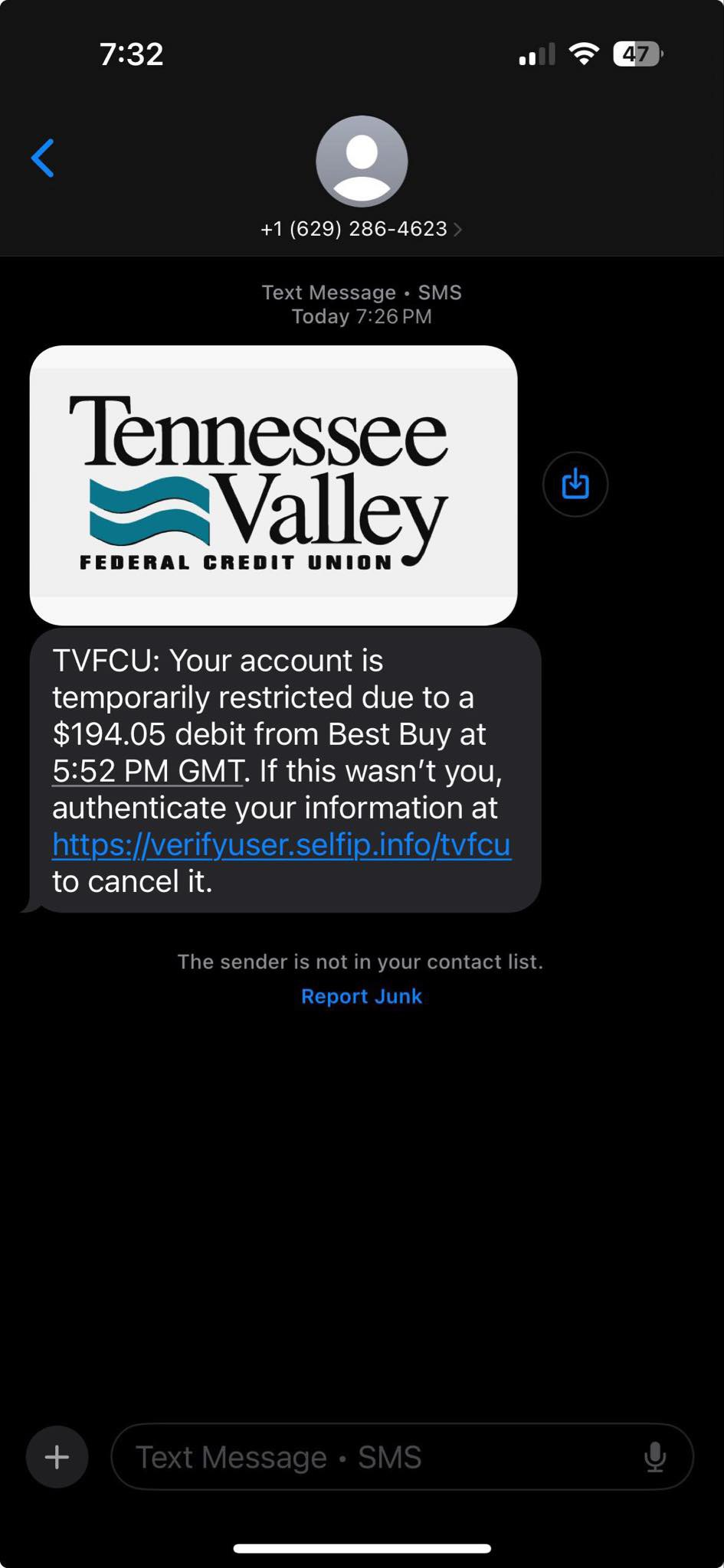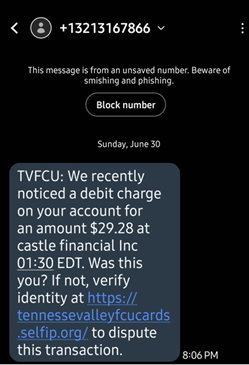Unfortunately, anyone can be targeted by fraudulent emails, calls or text messages. We want our members to be informed, alert and protect themselves from these various scams.
Phishing Scams Explained
Phishing is when a scammer sends an email to an unsuspecting consumer. That fraudulent email might look just like a legitimate credit union or bank email (right down to the company logo), but in fact it’s a forgery. If the consumer falls for the bait (thus the “fishing” reference), the thief could get credit card numbers, PINs, expiration dates, credit union/bank account numbers and even Social Security numbers.
With enough information, a con artist can run up fraudulent bills or even steal a person’s identity. Be on the lookout for any financial institution email that requests your personal or financial information. No financial institution will make that kind of request online.TVFCU will never send you an email requesting information, personal or financial. If you receive an email asking for this type of information, contact the financial institution directly for verification.
If you receive a phishing e-mail claiming to be from the credit union, be aware that these phishing e-mails are not from TVFCU and do not affect the credit union’s actual data system. At no time has that information ever been compromised. These scams are aimed squarely at consumers in an effort to trick them into providing their own personal information for use in criminal or fraudulent activities.
Vishing Scams Explained
Vishing is similar to phishing, except by phone — either in person or by an automated phone system. These criminals will claim to be from the financial institution whose customers are being targeted. They will request the same type of personal and account information.
The criminals behind these scams simply blast a large number of emails (or automated calls) out to the public hoping to hook unsuspecting consumers. Of course they are hoping someone will actually respond with their personal account information.
Smishing Scams Explained
Smishing is just like phishing and vishing. It is text-message fraud that occurs when criminals, posing as financial institutions, attempt to dupe mobile-phone users into giving personal information through text messages, calling a telephone number or visiting a fraudulent website. Education and diligence are among the best ways to protect yourself against such fraudulent activities.
Ways to Avoid Being Phished, Vished, Smished or Scammed
Phishing scams are prevalent and growing rapidly. Here are a few tips to help you avoid getting hooked by one.
- Never share YOUR$ digital banking credentials. Keep your usernames and passwords private. Only you should have access to your online banking or mobile app. Criminals can misuse your information to transfer funds, lock you out of your account, or apply for accounts and loans in your name.
- Do not respond to any unsolicited e-mail that asks for personal or account information. Don’t reply to it or click on any links contained in the message.
- Never give out personal information if you have not initiated the transaction or call.
- No legitimate financial institution will ever e-mail or call to verify personal and/or account information, because if they do business with you, they already possess it.
- Consumers are advised to be highly suspicious when receiving messages directing them to call and provide credit card or bank numbers. Rather than provide any information, the consumer is advised to contact their financial institution or credit card company directly to verify the validity of the message.
- Always verify e-mail/website addresses and phone numbers with a legitimate source such as your account statement. Do not rely on information contained in an e-mail or phone message.
- If a credit/debit card company actually calls to notify you of suspicious charges, they will not ask for your personal information. Instead they will verify that they have reached the cardholder and ask for them by name. Then they may ask the cardholder to verify the last 4-digits of their Social Security number (Note: They will not ask for your entire Social Security number, account number, expiration date or PIN). They will then verify if you made that particular charge or not. If anything sounds suspicious, hang up and call your financial institution directly.
- Avoid bogus sites by entering web addresses directly into the browser yourself or by using bookmarks you create.
- If you’re a tvfcuONLINE user, double check the URL that is in the address bar before entering your login credentials. It should read: https://yourmoney.tvfcu.com/.
- When prompted for a password, supply an incorrect one first. A bogus web site will accept it, but a legitimate one won’t.
- If you have fallen victim to such a scam and given out your personal account information, contact your financial institution immediately to protect your accounts, block your cards, fill out a fraud affidavit and take other protective measures as necessary.
For more information on Phishing, Vishing and other fraudulent scams please visit the Security Resources page.
Known Scams Reported by Members
4/9/2025
Local residents report receiving texts that appear to be from TVFCU, alerting the recipient to a transaction. The text includes the TVFCU logo and provides a link for the recipient to use to "review" the transaction.
These texts are note from TVFCU. Do not click the link, do not respond to the text.
If you have followed the link and provided any account, personal, or card information, contact your bank or credit union by telephone as soon as possible to secure your accounts.
Here are examples of the scam texts:


2/21/2025
Money Mules are recruiting victims from TVFCU
Posts have been reported on social media asking TVFCU members to message them directly. This type of post and offer is the beginning of a "money mule scam." The original poster will offer money in return for access to the victim's online banking account, or will simply say they will be putting money inside the victim's account, and the victim just has to then transfer some of it out, and the victim gets to keep some money themselves as payment.
Participating in this activity is illegal. The victim who is voluntarily providing their online banking information, or voluntarily accepting and transferring funds is acting as a money mule, helping to conceal the source of funds from a larger scam. Participating is not only illegal, but helps support the scammers efforts to steal money from others.
Never give your online banking information to anyone else, and do not agree to accept or send transfers with someone you do not know. You may end up with criminal charges, or losing significant money, or both.
Example of a post looking to recruit victims to be money mules:
2/18/2025
Text scam claiming to be from TVFCU claiming "A change Was made to your CHECKING"
Residents in the Chattanooga area have reported receiving text messages that appear to come from "TENNESSEE-VALLEY-CU" with a notification that "A change Was made to your CHECKING**0010", with a link. If the victim follows the link they are taken to a fake page that asks for either their online banking logon information, or debit card or account number information.
These texts are NOT from TVFCU. TVFCU will never ask for your login or debit card information through text messages and will not send a link to a site that asks for such information.
The scammers do not know who is a TVFCU member. They have a list of numbers local to Chattanooga and are texting everyone with the hopes that some recipients will be members who fall for it.
If you receive a scam text, delete it. If you receive a text and you're not sure if it's a scam, please contact us at 423-634-3600, 7 a.m. to 7 p.m., Monday through Saturday, and we'll be happy to help. If you believe you have fallen for this scam and given away your login information, card number, or account number, please contact us immediately to secure your account.
2/6/2025
Local residents receiving calls that appear to be from TVFCU, but they are not
Residents in the Chattanooga area have reported receiving calls that appear to come from TVFCU's main phone number or Fraud Department number, with the caller claiming to be from the fraud department. The caller typically says they need to verify charges and asks for sensitive information such as your card number, CVV, and expiration date.
These calls are NOT from TVFCU. Caller ID can be easily manipulated, and criminals often "spoof" numbers to make it appear as though the call is coming from a trusted source. If you receive a call from someone claiming to be from TVFCU's fraud department, hang up and call the number on the back of your card. If the call was legitimate, our fraud department will be able to assist you.
The scammers do not know who is a TVFCU member. They are simply targeting local phone numbers and have chosen to pose as TVFCU because we have the largest number of checking account holders in the area, increasing their chances of successfully deceiving someone
12/20/24
Members with mortgages receive misleading texts
Unscrupulous companies can obtain publicly available information to send misleading texts. In the example below, a mortgage refinance company sent a text to member who recently got a home loan with TVFCU. Because real estate transactions are a matter of public record, companies can get the information and use it to intentionally mislead a consumer into believing the text comes from a reliable source, like their current lender.

If the member clicks on the link, they are brought to a web page offering to refinance their mortgage loan. The company may be a legitimate mortgage company using misleading advertising practices, or it may be an attempt by scammers to obtain personal information.
This same type of misleading advertising is also seen through the mail, or by email.
12/18/24
Scam Threatens Account Restriction, Links to Site Asking for Personal Info
Local residents are receiving text messages like the one below, which threatens to restrict your account if you don't "authenticate your information" at a website the text links to.
TVFCU will never ask for your login or debit card information through text messages and will not send a link to a site that asks for such information.
The scammers do not know who is a TVFCU member. They have a list of numbers local to Chattanooga and are texting everyone with the hopes that some recipients will be members who fall for it.
If you receive a scam text, delete it. If you receive a text and you're not sure if it's a scam, please contact us at 423-634-3600, 7 a.m. to 7 p.m., Monday through Saturday, and we'll be happy to help. If you believe you have fallen for this scam and given away your login information, card number, or account number, please contact us immediately to secure your account.

10/23/24
Spoofing Scam Continues
Local residents continue to report receiving calls that appear to be from a TVFCU phone number. The caller claims to be from TVFCU and is calling about the member's debit card. The caller requests the member's account number, card number, and other personal details.
TVFCU will never call you to ask for your account number, Social Security number, or full card number.
If you receive a call that appears to be from TVFCU and the caller is asking for personal information, take note of the caller's name, then hang up and call TVFCU directly at 423-634-3600 to verify their identity. If the call was legitimate, we will be able to connect you with the right person at TVFCU.
8/22/24
Scammers Spoofing TVFCU Main Phone Number and Fraud Center Number
Local residents are receiving calls that look like they come from TVFCU's main number (423-634-3600), or the Debit Fraud Department number (833-886-6162). These calls are actually from scammers who are "spoofing" our numbers to make their calls seem legitimate. They ask for personal information such as Online Banking logins, debit card numbers, account numbers, or Social Security numbers.
8/5/2024
Scam Details:
Local residents are receiving calls that look like they come from TVFCU's main number (423-634-3600). These calls are actually from scammers who are "spoofing" our number to make their calls seem legitimate. They ask for personal information such as Online Banking logins, debit card numbers, account numbers, or Social Security numbers.
The scammers do not know who a TVFCU member is or not. They are calling numbers in our community hoping to come across TVFCU members.
Important: TVFCU will never call you and ask for your passwords, card numbers, or PINs.
What to Do:
1. Don't Share Personal Information: If you get a call asking for your details, hang up. TVFCU will never request this information over the phone.
2. Verify the Caller: If you receive a suspicious call, ask for the name of the TVFCU employee and then call us back at 423-634-3600 to confirm if the call was legitimate. Scammers cannot answer calls to this number.
3. If You've Shared Information: If you have given out personal details, call TVFCU immediately at 423-634-3600 to protect your accounts.
Stay alert and safeguard your information!
---
7/1/2024
Scam details:
Many members reported receiving a text claiming to be from TVFCU. The text provides a link and asks the recipient to follow the link to verify their identity. The link leads them to a page that collects either online banking information or personal information.
What to do if you've fallen victim:
The text is a scam. If you receive such a text, you can delete it and block the number. If you followed the link and entered any personal information, you should call TVFCU immediately at 423-634-3600 to protect your accounts.

1/31/2024
Scam details:
A member received a phone call that appeared to be from the TVFCU main number, 423-634-3600. The caller claimed they were from the fraud department, and that her Cash App had been used to make two purchases from ALDI. When the member confirmed she did not make Cash App purhcases at ALDI, the caller said that TVFCU would put money back in her account through Cash App. At this point the member realized it was a scam and hung up and notified TVFCU.
If the member had not realized it was a scam, she would have been guided into sending them money via Cash App, which would then be unretrievable.
The scammers are calling people who live in this area while spoofing the TVFCU phone number hoping to catch a person who is a member of TVFCU and then trick them into sending money via Cash App
What to do if you've fallen vicitim:
Because the transaction happened on Cash App, you will work with Cash App to report the scam and hopefully retrieve your funds. Here is a website from Cash App with more info: https://cash.app/help/us/en-us/6482-recognize-scams
10/9/2023
Scam details:
People have reported receiving a text that claims to be from "Tennessee Valley FCU". It says:
"Unrecognized attempt to charge 635.00 USD from your card on 10/09/2023. If isn't you? Visit _________"
The link provided takes users to a website that looks like the YOUR$ login page.
What to do if you've fallen victim:
If you followed the link, please update your YOUR$ password immediately and contact us directly at 423-634-3600 7am - 7pm Monday - Saturday to secure your accounts.
How to avoid being a victim of this scam:
Do not follow a link in a text message claiming to be from TVFCU. Never log in to YOUR$ using a link sent to you by text or email - always log in directly through the App or by visiting tvfcu.com.
9/8/2023
We have received reports of a potential scam targeting our community. Many members have reported receiving phone calls from individuals claiming to be representatives of TVFCU. The scammers do not know the members bank at TVFCU, they are likely calling a list of phone numbers they know serve the Chattanooga area and hoping to come across members who will then give up their information.
Scam details:
The member receives a call claiming to be from TVFCU. The phone number on Caller ID might even show TVFCU, as the scammers have the ability to spoof a phone number. The scammer then requests login information for online banking accounts, including passwords. We want to reassure you that TVFCU takes your security seriously, and we will never call you and ask for your online banking password over the phone.
The scammers have also asked for personal and account information. If they are successful in aquiring the login and password, they then attempt to transfer funds out of the members account, sometimes costing members thousands of dollars.
What to do if you've fallen victim:
If you have received a call recently where you shared any of your online banking details, including your password, please contact us directly at 423-634-3600 so that we can take necessary steps to safeguard your accounts and personal information.
How to avoid being a victim of this scam:
Remember, staying vigilant is crucial in protecting yourself from scams. Do not disclose sensitive information to anyone over the phone unless you have verified the legitimacy of the request. If you receive a call claiming to be from TVFCU, one way to verify it's legitimacy is to get the name of the person you are speaking with, and then let them know you will call them back. Then, call a number you know to be belongs to TVFCU, 423-634-3600, and ask to speak with that individual.
